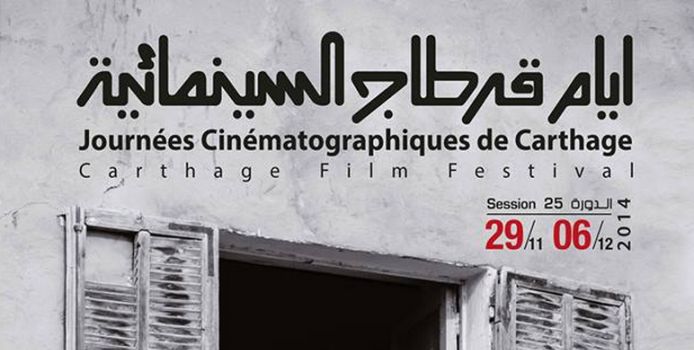The Cultural Importance Of The Tunisian Carthage Film Festival

20, living in Tunisia and fond of cinema, not so…
We don’t hear about the Tunisian cinema as often as we hear about the Moroccan or Iranian ones. We don’t have a major film festival like the Cairo International Film Festival or the Beirut International Film Festival, but we do have one important, symbolic one: the Carthage Film Festival. This festival takes place every two years and offers an interesting retrospective of Tunisian film.
Before we can consider the relevance of the Carthage Film Festival, let’s go through a little bit of history of the Tunisian film industry so we may learn more about its symbolism and contribution to the Tunisian cultural scene.
The Tunisian Film Industry
The medium that is film appeared in Tunisia in 1919, but only took off in the 60’s after the country became independent. The first Tunisian feature film made was a fiction directed by Omar Khlifi in 1966 called L’aube (Dawn). Following this feature, the 70’s and 80’s were considered as the Golden Years of the Tunisian cinema, during which movies started to tackle issues of the period, such as female empowerment, social and economical difficulties and anti-colonialism. The style of the Tunisian cinema was based on late Italian neorealism and strongly influenced by Federico Fellini‘s and Ettore Scola‘s works. Indeed, the relationship between Tunisian and Italian cinema was profound.
After the foundation of Empire Studios by Tarak Ben Ammar in 1974, several Italian directors came to shoot their movies in those studios, among them Robert Rossellini for The Messiah in 1975 and Franco Zeffirelli for Young Toscanini in 1988. The social themes discussed by Italian filmmakers were the ones the Tunisian audience of the time was interested in. That fact pushed several directors such as Nouri Bouzid to direct Man of Ashes emphasizing on the Tunisian society and its attitude towards sex, or Abdellatif Ben Ammar with Aziza, a movie capturing a country going through major changes. Directing movies reflecting the reality of the society was the main objective of Tunisian filmmakers, the realistic film genre a tool for activism.

These influences are still palpable in today’s Tunisians fiction film. Filmmakers didn’t divert from these few basic themes, causing profound redundancies regarding the movies’ stories and leading to increasingly insipid films wrongly categorized as cinema d’auteur. Tunisian cinema mainly targets a small part of the population, intellectuals in particular, imitating French cinema more and more. Meanwhile, they avoided the American blockbuster style which could, perhaps, have been aimed at and attracted a larger audience.
Promotion of Tunisian Cinema
The problem that emerged was a too small audience, which narrowed the market. Furthermore, in Tunisia, DVD piracy is a business: it is impossible to make profit from the commercialization of your movie. Consequently, very little profit could be made from the Tunisian film industry and this issue has persisted until now.
No market means few investors. Production companies are still weak and it is quite hard to receive funds for your movie when you are either young or new in the sector. Most of the time, filmmakers work with the cultural ministry, which is the major institution funding a selection of films. The overwhelming, stifling bureaucracy of the country discourages any director from fighting with the ministry for months. The result is Tunisian filmmakers developing auto-production skills and high independence, which are signs of their motivation and passion.
However, all these obstacles have caused a considerable decrease in the yearly movie output, reaching an average of 4 to 5 films per year, and a maximum of 10 in the last two years. Those movies could hardly be promoted, and what’s worse, there are very few cinema theaters across the country (which are mostly located in Tunis, the capital), and there is only one festival to provide a platform.
The modern Carthage Film Festival and the Jasmin Revolution
If in 1966 Omar Khlifi gave birth to L’aube, another newborn saw the light of day in the same year: the Carthage Film Festival (CFF). The event was an idea initiated by the Tunisian film critic Tahar Cheriaa and was brought to life by the first head of the Tunisian cultural minister, Chedli Klibi. The first aim of the festival was to promote the cinema of the Sub-Saharan Africa and of the Arab world, thus four categories were to be created: the long features (international competition), short films, documentaries and the national competition. The grand prize awarded to the winner of the first category is named “Tanit d’or” (Golden Tanit), after the Carthaginian Goddess Tanit, who symbolizes the mother.

The festival used to take place every two years, in cinema theaters and other cultural facilities in Tunis, the capital. Over the years, the CFF developed a reputation of being an event for only the intellectuals and the artistic elite of Tunis. Indeed, as mentioned above, the Tunisian cinema was already considered as cinema d’auteur, aiming at a very particular audience composed mostly of artists and intellectuals living in the capital. However, with the upcoming 25th edition of the festival, considerable changes were introduced: the festival will now take place every year, in different regions of the country, now targeting the South of the country as well, to make the festival available to a larger audience.
This is a very significant change, and what allowed it was the, what we may now call now a historical event, the Jasmin Revolution of the 14th of January 2011. This provided new resources and material to filmmakers, most of them turning to the making of political documentaries denouncing the old dictatorial regime of former president Zine El Abidine Ben Ali. This sudden burst of possibilities and willingness to tell the truth added to the turmoil of freedom of expression. The CFF of 2012 was crucial: it absolutely had to focus on the youth of Tunisia, who were thirsty for attention, and wanted to have their story told. Unfortunately, even though 82% of movies presented that year were Tunisian, the festival failed in fulfilling the expectations of both the audience and cinéphiles.
The importance of the (success of the) 25th Edition of the CFF

Now, you must understand why this 25th edition has to be successful, and why they implemented the organizational changes. Its expansion to southern cities such as Gafsa and Medenine, strengthens the idea of the Carthage Film Festival not only being an international festival, but also a national one. However, the presentation of Tunisian movies decreased to 44%, which caused a little bit of controversy. This shift also encourages filmmaking awareness around the country, not to forget now that the festival’s set to take place every year, it will allow filmmakers to be more prolific.
In a nutshell, in one week, the CFF shows more movies than all Tunisian cinema theaters in six months, and by targeting cities other than the capital it demonstrates that it isn’t only an elitist event, but that it’s accessible for everyone. The purpose of this 25th and renewed edition of the festival is to make unique films available to the majority of Tunisians, and to strengthen the festival’s symbolic value.
The Carthage Film Festival takes from November 29 to December 6, 2014. You can find more information on the JCC Tunisie website.
What do you think about Tunisian movies? Have you ever seen one?
(top image: Carthage Film Festival Poster – source: JCC Tunisie)
Does content like this matter to you?
Become a Member and support film journalism. Unlock access to all of Film Inquiry`s great articles. Join a community of like-minded readers who are passionate about cinema - get access to our private members Network, give back to independent filmmakers, and more.
20, living in Tunisia and fond of cinema, not so long ago I directed my first short-film. I strongly believe God is a voyeur and Hitchcock is friend. And if a movie caused a big controverse you can be sure I watched it and liked it.













